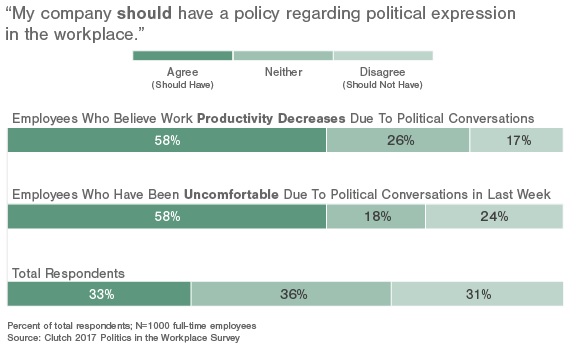They say “never talk about politics or religion” in the workplace. While that may be extreme, and at times unavoidable, there is certainly something to be gained from learning how to address political discourse at the office.
In today’s very passionate, sometimes divisive, political climate, especially during election season, HR professionals should be prepared for a greater number of heated discussions. While some conversations can be healthy and encouraging, it should never progress to a point where employees personal values feel attacked. If not properly attended to, raising tensions among colleagues can lead to an unhealthy company culture, unhappy staff and poor work performance. One American Psychological Association study showed that political talk in the office decreases employees’ quality of work and productivity, makes them feel more isolated and breeds workplace hostility.
Are you now wondering how can companies diffuse sensitive situations and prevent further outbursts?
An HR professional’s first prerogative should be to clear the air, as reactive measures to one-off situations aren’t enough. Trying to brush aside workplace arguments won’t help anyone or the company.
 To address lingering concerns and prevent future occurrences, companies should consider implementing a political expression policy that acts as a guideline for staff on what is acceptable in the office. Don’t be concerned that such a policy may be infringing on employees’ free speech; companies are within their rights to rein in controversial political discussions and also can ban political campaigning in the office if it chooses. In fact, half of employees who have felt uncomfortable in the aftermath of in-office political arguments say they wish their company had some type of policy.
To address lingering concerns and prevent future occurrences, companies should consider implementing a political expression policy that acts as a guideline for staff on what is acceptable in the office. Don’t be concerned that such a policy may be infringing on employees’ free speech; companies are within their rights to rein in controversial political discussions and also can ban political campaigning in the office if it chooses. In fact, half of employees who have felt uncomfortable in the aftermath of in-office political arguments say they wish their company had some type of policy.
And a political expression policy doesn’t need to be overly robust. It can simply state that employees are expected to reserve their political conversations for when they are outside the office and remind them that respectful, professional behavior is expected at all times. In other words, a little conversation on current happenings is fine, but loud arguments that disrupt workflow or performance, insult or make employees feel uncomfortable, or negatively impact the office environment won’t be tolerated.
With a growing number of celebrities using their platform for political advocacy, many non-celebrities (i.e. employees) feel empowered and a sense of duty to make their views known by everyone and advocate for what they believe in. While having a diverse representation of opinions can be beneficial, and even contribute to a company’s profitability, the opposite can be said of sharing controversial personal beliefs at the office. Companies, by enforcing a gentle policy that reminds employees that not everyone has the same political views, which is more than OK, as well as provide a safe place for employees to discuss any discomfort experienced due to their political beliefs, can curb potential unease in the workplace.
This article was originally published on wforce.org.
